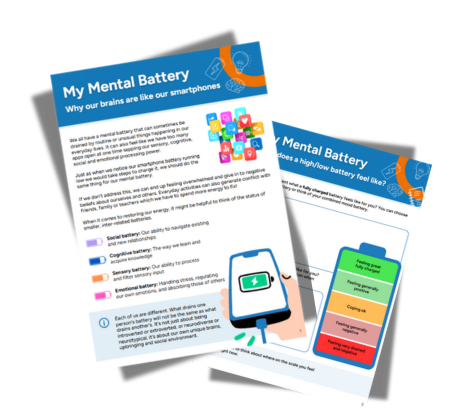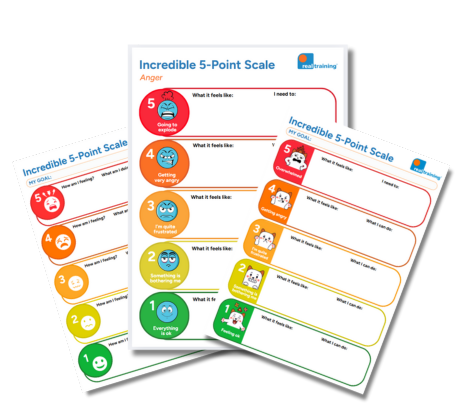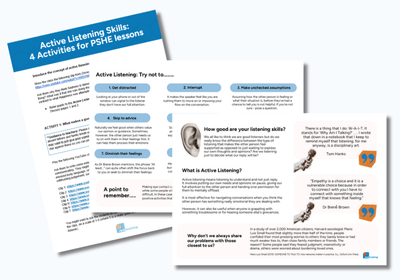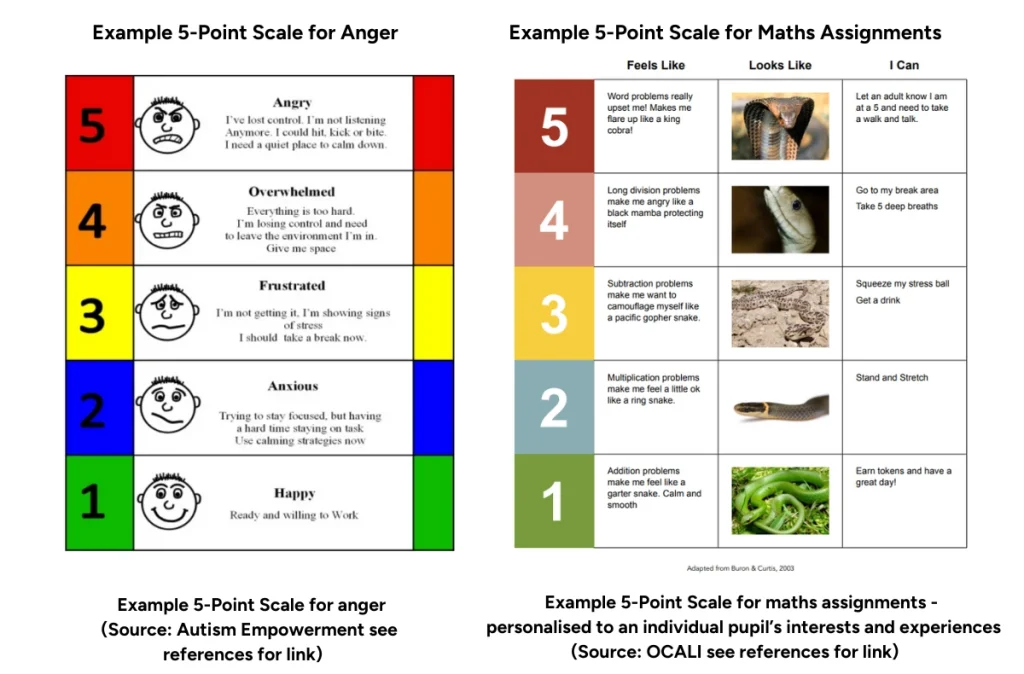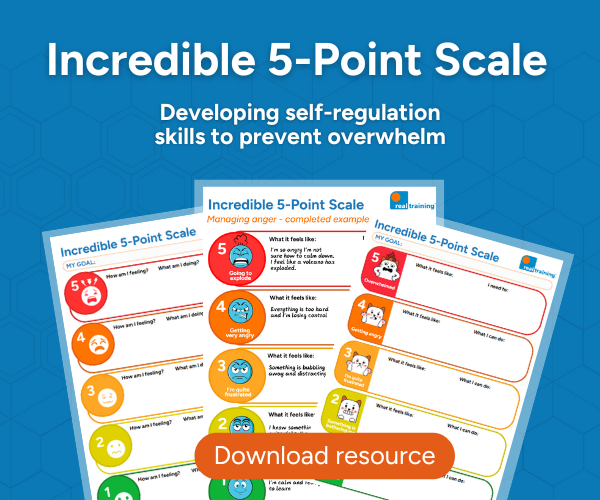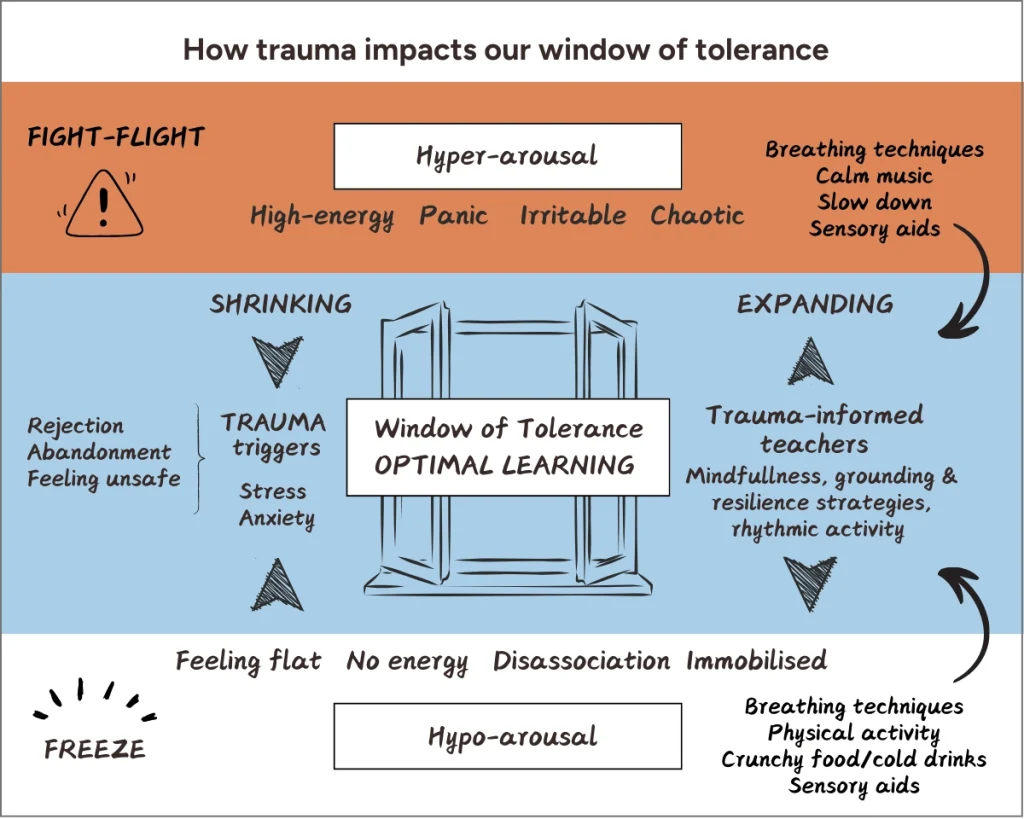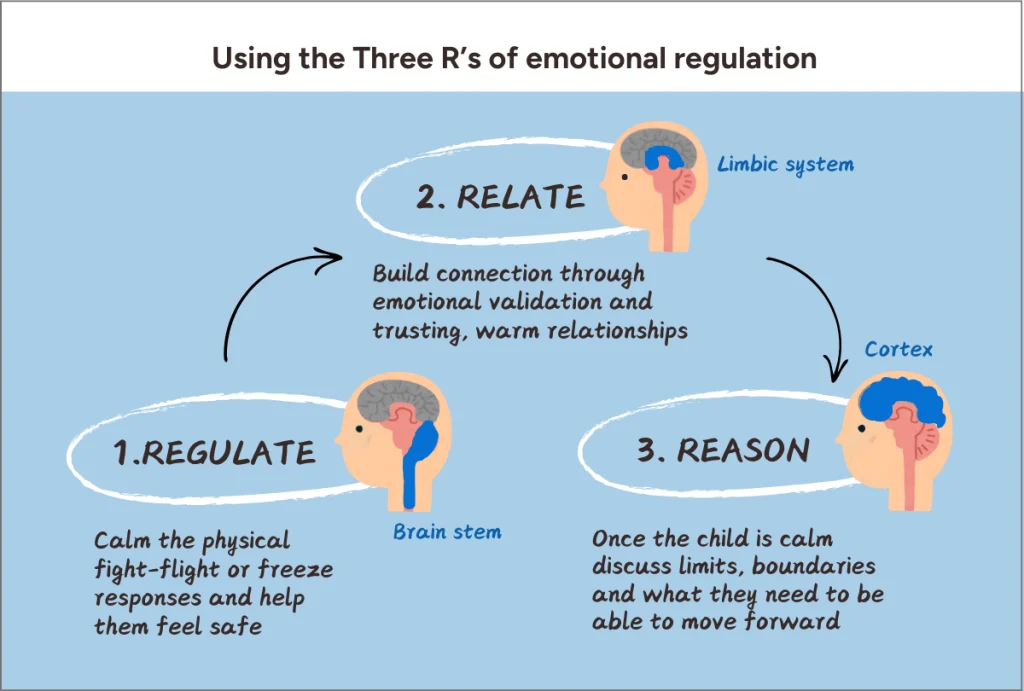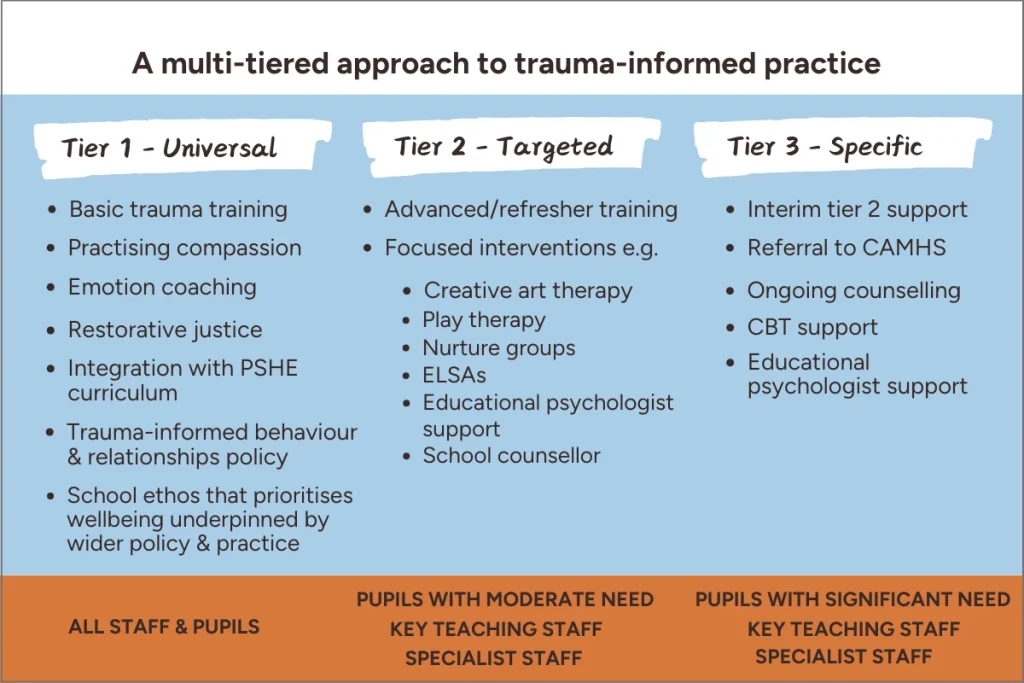Introducing: Practitioner of The Dyslexia Guild – Assessor of Access Arrangements
We’ve been working alongside our sister company, The Dyslexia Guild, to create a new membership grade for Certificate of Psychometric Testing, Assessment and Access Arrangements (CPT3A) graduates.
Recently launched, the Practitioner of The Dyslexia Guild Assessor of Access Arrangements (PDG3A) membership, provides a number of professional benefits to those who have studied our CPT3A qualification. By choosing to become a member, you’ll be able to:
- Gain formal recognition for your expertise in access arrangements assessment
- Connect with a network of like-minded professionals dedicated to supporting individuals with dyslexia or literacy-related difficulties and those that require access arrangements
- Borrow selected assessment tests for free through our library*
- Participate in a variety of opportunities for professional development
- Save up to 10% off most products purchased through the Dyslexia Action Shop
- Enhance your professional standing and demonstrate your commitment to best practices.
*terms may apply
Eligibility
To be eligible for this grade of membership, you must hold the Certificate in Psychometric Testing, Assessment and Access Arrangements (CPT3A) from Real Training (similar courses will not be recognised).
Please note: this grade is not applicable for those who already hold Guild membership at Member (MDG), Fellow (FDG) level or those who already have an Assessment Practising Certificate (APC).
Feedback from our delegates is very important to us. This is why we ask every delegate to fill out a feedback form upon completion of their course. This provides us with extremely valuable data on what we’re doing right, and where we can improve.
We’ve been carefully analysing the data from 2024, and below are highlights from the results.
- 93% of delegates rated our course as ‘good’ or ‘very good’.
- 94% of delegates rated the extent to which their course met their developmental priorities as ‘good’ or ‘very good’.
- 94% of delegates rated the course tutor feedback, support and interaction as ‘good’ or very ‘good’.
Comments from our delegates!
“I have found the feedback extremely informative and it has helped to develop my academic writing. My tutor was quick to respond to emails and answer any questions I had”
- Samantha Hutton, Autism Spectrum Conditions delegate, 2024
“The in-person work was inspirational. It was really clear and useful. Feedback on all aspects of the course throughout the online section has been really constructive”
- Mark Westwood, CCET Intensive delegate, 2024
“I felt well supported, any queries were answered straight away and I always felt like I was talking to a real, knowledgeable person rather than getting a standard response”
- Victoria Rogers, Dyslexia Professional Report Writing delegate, 2024
“My tutor was always responding to my questions and provided excellent feedback on the improvement of my essays”
- Panagiota-Maria Pantoulia, International Award for SEN Coordination delegate, 2024
“The tutoring I received was excellent, really useful suggestions and advice and any questions that I asked were responded to promptly”
- Jo Platt, Senior Mental Health Leadership Certificate delegate, 2024
If you are thinking of enrolling on a course with us, either for the first time or are a returning delegate, please don’t hesitate to get in touch with us on +44 (0)1273 35 80 80 or contact us here.
We all like to think of ourselves as good listeners. Especially those of us who work in education. But the ability to listen actively is a distinct skill that’s not as intuitive as it first appears.
When we hear about a problem or challenging situation being articulated by a colleague or young person, our instinctive response is to try to analyse that problem and help them fix it. But in some contexts, this natural desire to problem solve and to make the person feel better as soon as possible, needs to be put on ice.
We have to slow down and just be in the moment with the young person, absorbing and sitting with their emotions, rather than seeking to distract from them.
Suppressing the desire to broadcast
To paraphrase Stephen Covey, active listening is the difference between “listening to understand” and “listening to reply”. A difficult skill for any adult to master perhaps, but potentially even more so for children. This is the first generation to grow up inside a highly addictive digital world – where people are in constant ‘broadcast mode.’ Just think of the content creators and TikTok gurus with a constant flow of 30-second soundbites of advice, opinion and quick-fixes.
And yet active listening skills are essential for all of us (teachers, parents, students, employees, managers) to become more empathetic and more productive – so where should we start?
Active listening: 7 principles
Practising good active listening involves suppressing our ego and shifting the locus of communication to the other person – giving them permission to offload (usually on an emotive topic). In doing so we become aware and responsive towards their feelings – something psychologists refer to as “attunement.”
It can be helpful to break it down into the following principles:
- Paying attention – using non-verbal and verbal cues; such as turning your body and head, and maintaining good eye contact (exceptions being when the other person finds this threatening or culturally inappropriate).
- Encouraging – nodding, smiling (or frowning in empathy as appropriate) as well as short interjections.
- Eliciting – asking open-ended questions to draw more from the speaker. This can sometimes mean just waiting in silence, allowing the other person time to process their thoughts and emotions. ”What else?”
- Reflecting and Clarifying – making inferences and checking they are correct, helps to show the person that we care as well as helping us get on the same page. Mirroring some of their language can also help with attunement. “This situation is clearly leaving you drained, as you say – and it’s having an impact at home too – am I right?” Or “Help me understand…is it that…?” “It seems the crux of the issue is….”
- Validating – acknowledging the gravity of the situation and accepting the person’s emotional response. “It sounds like this past week has been very hard for you – that must be really tough” or “I’m so glad you spoke to me because this is really important.”
- Summarising – using all that we’ve learned from the speaker so far to paraphrase what they have said. “So you’re really missing Adam since he moved to France, he was your best friend and a good listener and it’s taken you longer than you thought to realise how important he was and now you feel really sad that he’s not around to talk to after school.”
- Guiding – giving advice (if there is any to be given) should always come at the end of the process and if possible be focused on inspiring the other person to investigate solutions. ”Some people find it helpful to try X or Y.” If it’s a work problem a colleague is raising you don’t always have to agree with them but you do need to convey to them that you’re taking what they’ve said on board.
Some things to avoid
Sometimes it’s also useful to understand what can derail active listening.
- Assuming you know what it feels like; before really giving the other person the opportunity to tell you. If a colleague is having anxiety adjusting to a step up, cutting straight in with “I remember when I joined the senior leadership team – it was a big leap but I just kept ploughing on and eventually things settled down” fails to acknowledge the immediacy of their feelings and can emphasise the distance between you.
- Interrupting; although sometimes useful, it takes a very skilled listener to know when and how to do this. Better to sit tight and wait.
- Shifting the emphasis back onto you; can be damaging even with the best of intentions. Take a family break-up, for example. An adult responding; “My Dad walked out on me too, when I was younger than you”, often means the young person will hear; “This happened to me. In fact it was worse for me, but I dealt with it and so should you.” In other scenarios our own feelings of insecurity creep out “at least you know what the problem is with your project – I don’t even know how to get started….” or “you’re going to do great – it took me years to learn how to get through OFSTED without being nervous.”
- Being fearful of silence; one of the most surprisingly difficult parts of active listening but some of the best introspection can come from letting it linger. It’s difficult to judge the best cadence admittedly.
Encouraging active listening skills in children
Like many social skills, active listening can be understood on different levels. While primary school PSHE lessons may focus more on basic behaviour, making eye contact, thinking about what has been said before you respond, not getting distracted etc. it’s only once children become older that they can more fully grasp the seven principles mentioned above.
There are two important points to consider before attempting to teach or develop these skills in others. Firstly, it’s really important that young people are able to understand the full value and purpose behind active listening and so want to engage with it. Secondly, we need to check-in with the other adults around them – are we modelling it often – and correctly?
There are many contexts in which learners can start to practice their skills, before they dive headfirst into more emotionally heavyweight conversations; in English and PSHE lessons and in smaller groups such as on student councils and during form time, for example. Active listening skills can also form an essential part of restorative justice systems where both parties listen to one another’s grievances. In all instances, pupils should be recognised and praised when they make an effort and/or do it well.
[We’ve pulled together a few ideas for active listening activities aimed at teenagers that you can download here.]
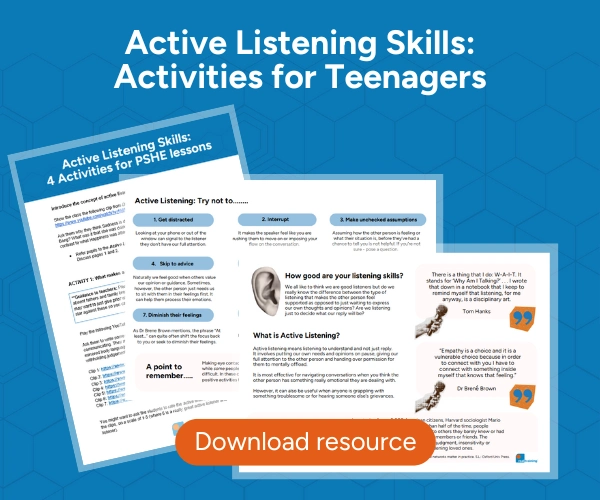
Helping children in distress
If a child is finding something difficult then teachers may well find themselves at the first point of call and sometimes can help right away. However, when a young person is in distress the situation changes. There may be safeguarding concerns, you may need to refer to your designated safeguarding lead or SMHL.
The role of ELSAs
One great way that schools can provide small group or one-to-one support to help children experiencing anxiety, bereavement, anger or other social/emotional needs is by using ELSAs (Emotional Literacy Support Assistants).
ELSAs, often teaching assistants, receive training in active listening (and basic counselling techniques) from educational psychologists and participate in regular supervision. It allows them to form personal connections with children they are working with who often need more time and space to process their emotions. Schools that have started ELSA programmes frequently report many positive benefits including improved attendance, positive feedback from teachers and parents and of course significant improvement in self-reported well-being from pupils themselves.
You can now train to be an ELSA as part of the recently launched Level 5 Specialist Teaching Assistant apprenticeship which is fully funded through the Government’s apprenticeship levy.
Sound draining? You’re probably doing it right.
Anyone can get started with active listening but it may not feel natural at first. Counsellors and EPs spend years honing their skills to be able to practice at a more nuanced level with more complex conversations.
Observe others who do this well in your school. It might be someone on your senior leadership team, a fellow teacher or a dinner lady. Some older children are surprisingly good at it. If you line manage others or interact with parents of vulnerable children, think about these interactions too.
The effort we put in pays dividends. Some level of active listening (however basic) is a valuable skill for us all. It can help us to function better in our family unit, as part of a more inclusive school, and in a more productive workplace.
Find out more: Courses
Explore the Level 5 Specialist Teaching Assistant apprenticeship with ELSA qualification
Find out how to become a better coach or mentor in a school environment in our Coaching and Mentoring in Education course.
Further active listening resources
Active Listening for Teens: Take a look at our ideas for PSHE activities here
Harvard Business Review: A great video about active listening in a line-management context: www.youtube.com/watch?v=aDMtx5ivKK0
Brené Brown on Empathy: A powerful video that neatly explains the difference between listening with empathy and listening with sympathy: youtube.com/watch?v=1Evwgu369Jw&vl=en-GB
Education Support: Jacob Morgan, author and Founder of Founder of FutureOfWorkUniversity.com introduces the BUILD acronym: jacobm.medium.com/5-ways-to-practice-active-listening-924b58746494
Know Yourself, Grow Yourself!
This year marks the 11th anniversary of Children’s Mental Health Week – a campaign led by mental health charity, Place2Be. This year’s theme is Know Yourself, Grow Yourself and is focused around the theme of self-awareness and building resilience.
The need to support our young people is pressing; according to an analysis from The Children’s Society, 15-year-olds in the UK report the lowest life satisfaction scores of all the countries across Europe. [1] Helping children face the pressures of modern life means working on personal resilience, as well as encouraging good listening skills.
We’ve put together a range of resources to help pupils become more self-aware and develop personal strategies to nurture their own wellbeing, or to support emotional regulation.
Charging My Mental Battery:
KS2 Primary Resource
We all have things in our lives that absorb a lot of our mental energy. Our brains need recharging sometimes – just like a battery does.
This resource looks at some of the things most likely to be impacting children in Year 5 and 6, helping them build self-awareness and develop personal recharging strategies to improve their mental wellbeing.
Includes: Worksheets, activities and a battery-charging weekly planner.
Charging My Mental Battery:
PSHE/Group Work for Teens
This resource helps teens build awareness of things that drain their emotional, social, cognitive and sensory battery.
It provides tips for managing stress as well as encouraging teens to think about different strategies to restore their mental and emotional energy. It also includes a basic energy accounting tracker which neurodiverse students might find especially helpful.
Includes: Teacher guidance notes, worksheets, battery charging weekly planner and energy accounting tracker.
Incredible-5-Point Scale
The Incredible 5-Point Scale was originally developed by Kari Dunn Buron and Mitzi Curtis to help autistic pupils with self-regulation.
It can, however, be used to support any pupil who is particularly struggling with emotional self-regulation.
Includes: Guidance notes and downloadable pdf examples, including scales for anger and social anxiety.
Active Listening For Teens
We’d all like to think we are good listeners but how often do we listen to reply rather than listening with genuine empathy?
This resource breaks down the skill of active listening and explains some of the key things that good listeners tend to do (and what they avoid!).
Includes: Active listening worksheet for teens as well as four activity ideas for PSHE lessons. Take a look at our accompanying blog.
Other Children’s Mental Health Week Resources
Teachwire are showcasing a range of great free resources on their dedicated round-up page.
Visit the Place2Be website to download free assembly guides, activities and top tips for primary and secondary schools. This year they have partnered with Disney to bring you resources using Inside Out characters!
The National Literacy Trust has some great resources for children’s mental health week based around Charlie Mackesy’s book The Boy, the Mole, the Fox and the Horse, including an assembly, lesson plan and KS1/P2-3 and KS2/P4-P7 activities
Info 7 have a great selection of free films that deal with the topic of mental health that are free to stream in your classroom. They are also offering resources including short videos and lesson plans that cover everything from anxiety and bereavement to social exclusion and mindfulness for a broad age range.
Premier League Stars are offering this Building Self-Esteem resource which helps pupils think about their identity and how it relates to self-esteem.
1) The Children’s Society Good Childhood Report 2024. https://www.childrenssociety.org.uk/sites/default/files/2024-08/Good%20Childhood%20Report-Main-Report.pdf
The Incredible 5-Point Scale is a great visual tool that can be used to help children identify, understand, express and manage their emotions.
It’s particularly (although not exclusively) useful for supporting autistic children. However, it’s also a resource that is sometimes misunderstood in schools. We’re going to take a look at the best way to leverage the tool and how you can create personalised versions of it.
How was the Incredible 5-Point Scale developed?
The scale was created in 2003 by Kari Dunn Buron and Mitzi Curtis, highly experienced teachers from Minnesota who have many years of experience teaching autistic students. It was designed so that each level represents a different level of intensity surrounding a specific emotion and its associated behaviour/s. Together with helping to recognise emotions and planning how to respond and self-regulate (or seek help), the tool can also be used to explore ‘what happened’ after a problem incident.
It can be used for almost any kind of emotional regulation such as anger management, learning about social interactions (such as respecting physical space or dealing with winning and losing) or even particular behaviours such as modulating tone of voice.
Autistic children and adults often have a strong preference for using systems, but may struggle with the vocabulary for emotional introspection. Talking in numbers and colours instead of describing or naming an emotional state can help make this activity easier for some people.
The broad benefits of the scale include its:
- application to any age group
- ability to create a shared language to easily discuss emotions or behaviour
- avoidance of language that could be seen as blaming
- capacity to quickly communicate needs and generate self-awareness in the moment
- flexibility and the fact that it can be easily personalised to the individual
How to use the scale and create personalised 5-Point Scales
- Identify the behaviour that you would like to work on. The child should be involved as much as possible; this will depend on their age and communication capability. A starting point would probably be asking questions such as, ‘What is happening that we would like to stop happening?’ or ‘What is not happening that we would like to be happening?’. This will probably be a behaviour that is underpinned by an emotion / several emotions (e.g., walking out of class, calling out answers or not speaking in school).
- Identify the skill or understanding of concepts that needs to be learnt in order for the thing to happen/stop happening (e.g., tolerance to ‘wait’, impulse control or ability to manage fear).
- Break the intensity of feeling into five parts. For example, let’s say the skill you were trying to develop is managing anxiety while interacting with other children. You sit down with your pupil, Joe, and talk about how he is feeling at each level and how this relates to his behaviour.
- For Joe, this might look something like the following;
- Level 1: How am I feeling and what is happening? I am feeling happy and relaxed. I am talking with others, playing games and joining in easily.
- Level 2: How am I feeling and what is happening? I am feeling a little bit nervous, but I can still manage. I might need to ask for a little extra help or take a short break.
- Level 3: How am I feeling and what is happening? I’m starting to feel anxious. My tummy might hurt, and I might avoid talking or doing things I usually enjoy. I need to tell an adult or one of my close friends how I am feeling.
- Level 4: How am I feeling and what is happening? I feel really anxious and I am not sure what to do to make myself feel better. I need to ask an adult for help.
- Level 5: How am I feeling and what is happening? I can’t manage at all. I don’t feel like I can use my words. I need to wave or grab an adult to come and help me.
- Level 1: How am I feeling and what is happening? I am feeling happy and relaxed. I am talking with others, playing games and joining in easily.
- Create a visual scale. Talk with Joe about the levels (1-5) and develop a descriptor for each. The different levels will then be assigned different colours. Sometimes a picture can also be used to depict what each level ‘looks like’ for them. If a young person has a particular affinity with characters or animals (Disney, Mario World, Harry Potter, cats etc. you could consider using these).
- Discuss strategies to help manage the feeling when thinking about what each level looks like, together with describing the feeling, ask the child to suggest what they ‘might’ do [i.e., a behaviour] to help. Returning to our example, for Joe this might look like Level 3: I need to tell an adult or one of my close friends how I am feeling.
- Teach the scale. A story might be a good way to explain to the child what each level means and how it feels. Real-life examples can also be used to illustrate each level.
- Use the scale – and review it. Encourage the pupil to use the scale to monitor their own emotions and behaviours. A ‘check-in’ at the start and the end of the day can help with this. The pupil might rate themselves according to where they were on the scale at different times of the day. This information could be used to jointly identify triggers or warning signs – and how to manage and/or avoid these.
[Take a look at our free downloadable examples for social anxiety and anger, as well as generic scales – remember templates are just a starting point]
IDEA: You might want to create a smaller portable version that the pupil can carry around in their school bag and refer to more discretely. Once the young person knows the scale well, they may just need a slimmed-down ‘prompt’ version. Take a look at this example that’s designed to fit on a keyring (below) from Cheshire East Council.
Things to try to avoid when using the scale
1. Taking a top-down approach
- Avoid: Adults taking it upon themselves to create the scale and then discussing it with the pupil, rather than listening to their specific experiences and tailoring it to their individual needs, emotions, and triggers. A template and/or some examples can be a good starting point, but the end output should be personalised.
- Why it matters: The scale works best when it is used to generate self-awareness – the only way to do this is if it is produced collaboratively. All levels should reflect emotions or behaviours specific and meaningful to the individual.
2. Using it with children who aren’t yet able to reflect and regulate
- Avoid: Forcing children outside of their comfort zone, by trying to teach the scale when they can’t yet grasp the necessary skills to use it well.
- Why it matters: Children need to be able to not only recognise their own emotions (with some support), but also engage in self-regulation afterwards. If you find yourself intervening too much it may be because the child is too young or doesn’t yet have the vocabulary to engage.
3. Using the tool for behaviour modification
- Avoid: Using the scale as a punishment/behaviour modification tool or linking it too closely to school rules.
- Why it matters: This risks shaming the individual, and increasing anxiety or disengagement, reducing its effectiveness by removing agency and trust. Instead, talk about possible natural consequences of specific actions if required.
4. Not using it consistently
- Avoid: Inconsistent use amongst key adults around the child including other support professionals, teachers, TAs, and (in some contexts parents as well).
- Why it matters: Having different systems to name and label behaviour is going to get confusing very quickly. Having some consistent routines to help self-regulation helps build positive habits.
5. Overwhelming complexity
- Avoid: Adding too much detail/ too many levels.
- Why it matters: The strength of the Incredible 5-Point Scale lies in its simplicity. Overloading the scale can cause confusion.
6. Not linking to coping strategies in line with emotional regulation development
- Avoid: Missing out actionable strategies for each level.
- Why it matters: The scale should gradually be used to guide children toward coping mechanisms – some of which might involve asking for help. Pupils should be encouraged to recognise when they are at Level 2 or 3 in particular, as this is where they might have most success bringing things back under their control.
7. Not reviewing the scale appropriately
- Avoid: Treating the scale as static and unchanging.
- Why it matters: Children are developing all the time and so are their needs as well as their coping strategies. It may be that the individual no longer needs the scale for a particular behaviour or that they need greater support if other stressful things are going on in their lives or their normal coping mechanisms are exhausted. Sometimes things about the school routine, peer dynamics or available support changes and their Incredible 5-Point Scale needs adjusting to reflect this.
Further reading
Read the original book from Kari Buron and Mitzi Curtis:
Buron, K.D., & Curtis, M. (2003). The incredible 5‐point scale: Assisting students with autism spectrum disorders in understanding social interactions and controlling their emotions responses. Shawnee Mission, KS: Autism Asperger Publishing Company.
Kari Dunn Buron’s accompanying blog has some great downloads and her blog covers extended applications www.5pointscale.com/
Autism Classroom Resources have written up a useful introduction to the scale: autismclassroomresources.com/the-incredible-5-point-scale-review-and/
Southwark Council’s autism support team have produced a helpful overview including quite a few examples for anger/volume etc: localoffer.southwark.gov.uk/assets/attach/677/5-Point-Scale.pdf
Example 5 Point Scale for Maths assignments: from OCALI (Ohio Centre for Autism and Low Incidence) Take a look at several examples of what you can do with a scale by relating it to an individual’s special interests, as well as a video about how practitioners are using the scale.
The Incredible 5-Point Scale Fact Sheet from Autism Empowerment – useful resource that also describes the anxiety curve model: Download the factsheet.
Autism Toolbox: Example of a scale completed for a particular individual pupil:
autismtoolbox.co.uk/wp-content/uploads/2022/09/5-point-scale-example.pdf
“I talk to people a lot better because in the first lesson, I didn’t talk at all. I talked to Miss … I whispered in Miss’s ear if I wanted to say something … but last time I did it, which was yesterday. I just … I was speaking.” – Alois (quoted in Purcell, Kelly & Woods, 2023)
The quote above is from Alois, a secondary school pupil reflecting on how time spent with his ELSA (Emotional Literacy Support Assistant) helped build his confidence in class.
Although there is limited large-scale research on the effectiveness of ELSAs, there are smaller studies, such as the one quoted above, that suggest they can be highly effective across all age groups. Headteachers and class teachers often report reductions in absenteeism, as well as increased confidence and engagement in learning amongst children on the programme.
Here are some key steps to maximise the impact of ELSAs at different stages of your implementation journey.
What are ELSAs and how do they help children with SEMH needs?
The ELSA programme is run by Educational Psychologists and involves training school staff (usually teaching assistants) in theoretical psychology, active listening and practical activities. The programme is based on the principle that teaching emotional literacy – i.e. the ability to recognise and manage emotion in themselves and others, helps children to thrive.
ELSAs support children who are:
- anxious
- have low self-esteem
- have problems managing anger and frustration
- have difficulties making friends (are being bullied or doing the bullying)
- engaged in conflict at school (with adults or peers)
- suffering from bereavement or trauma.
Dr Joanna Wood is a lead psychologist at Real Group who has spent a considerable amount of time training ELSAs. “A good ELSA is one who is warm, interested and level with the child” she explains. “It’s not a matter of I’m going to fix you, rather let’s find a way through this together.”
How to maximise the impact of ELSAs (consideration phase)
Use an implementation framework
If you are just starting out, it can be helpful to follow a framework to enable you to embed and sustain ELSA. Dr Hannah Fairall, an Educational Psychologist and academic lead working for Real Group, completed her doctoral thesis on ELSA implementation. She has developed this downloadable framework which provides valuable step-by-step guidance.
[DOWNLOAD YOUR COPY: Of Dr Fairall’s Implementation Framework here]
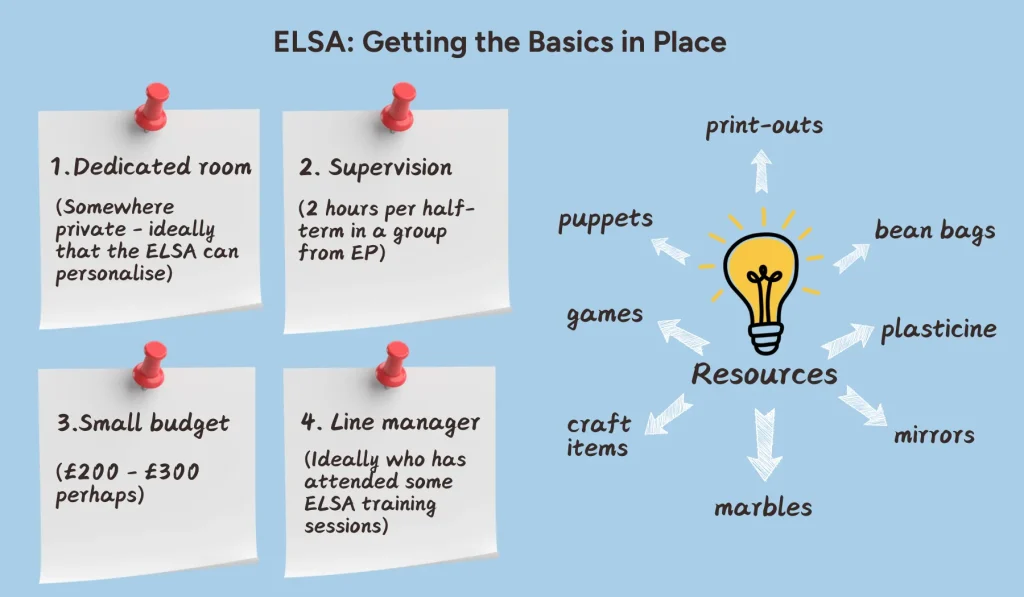
Scrutinise your referral system
Developing a robust referral system hinges on having a detailed mental health provision map in place, matched to your pupil population. This helps the SENCO and Senior Mental Health Lead work out when ELSA intervention will be tried as a first port of call, as opposed to (for example) using Nurture Groups, or the school counsellor.
Ideally, the ELSA needs a clear target to focus on, and inappropriate referrals should be filtered out at either end of the scale, i.e.
- Teachers who refer because a student’s behaviour is difficult to manage in class
- Students who need more specialist/long-lasting support
“There must be a clearly defined element of emotional literacy need,” says Joanna. “You would never dream of implementing a literacy intervention without a consistent referral process and clearly defined target outcomes at the end. ELSA should work in a similar way.”
Creating a simple triage map and formal referral process can contribute to this. “Sometimes ELSAs become so embedded into a school that staff feel there’s no need for formal referral,” warns Joanna, “but it really does help to have a clear system.”
[EXPLORE FURTHER: New to-role Senior Mental Health Leads can learn how to build and enhance the mental health provision map for their setting on our senior mental health lead training courses]
[BECOME AN ELSA: With the Level 5 Specialist Teaching Assistant with ELSA status]

Look out for ELSAs’ own wellbeing
“In reality, as much as we try to avoid it, ELSAs are dealing with all sorts of very challenging things,” Joanna emphasises. “People who work in education often underestimate the weight of the emotional load that can be passed from child to adult” she explains, “this is why supervision is so very important, but it can only go so far.”
Joanna is keen to point out that an experienced line manager is also important – ideally, someone who has also attended some of the training sessions and is familiar with the content. She also suggests scheduling some time when ELSAs within schools can get together to connect, perhaps a fortnightly Friday lunch break before the weekend.
Make sure there is whole-school buy-in
The Senior Mental Health Lead will also want to consider how ELSAs will fit into their setting’s vision and provision for mental health and wellbeing.
Everyone in school should be aware of the aims and objectives of the ELSA programme and how the role fits in with others such as mental health first aiders, the SENCO, the pastoral support team and the DSL.
Recognise that time will need to be allocated not just to running the sessions, but for planning, engaging with supervision, and attending meetings with the mental health team. When it comes to sacrificing lesson time, make sure you communicate this as early as possible to teachers whose lessons will be impacted.
Focus on ELSA retention and development with clear career development
Because trusting one-to-one relationships are at the heart of ELSA, high staff turnover can be a problem. Creating a clearer career pathway for TAs and more professional development opportunities is just one way to address this. The recently approved Level 5 Specialist TA apprenticeship provides such an opportunity.
Real Training’s Educational Psychologists have teamed up with our sister company Educational and Sporting Futures, to offer ELSA status if you choose the social and emotional wellbeing strand of the Level 5 apprenticeship. This will allow you to practise as an ELSA while gaining your Level 5 qualification and (optional) HLTA status with supervision provided for the duration of the course.
Careful timetabling
Potential loss of subject time for ELSA sessions has to be weighed up with the impact of missing activities such as choir or football (which could also benefit the pupil’s mental health). One way to address this is to get creative. “I’ve known ELSAs who get involved in cookery, music or basketball with pupils as a way to help them to connect – it’s all about following the interest of the child and building the relationship,” Joanna says.
Many ELSAs use lunch breaks to try to fit in children as waiting lists can be long. Joanna cautions against this as doing so may mean the pupil misses out on important social activities, as well as putting pressure on the ELSA.
Be clear on targets and measuring wider impact
ELSA work is bespoke, strengths-based and person-centred. Targets are individually constructed with the young person and linked to referral information. “Targets are best thought of as the smallest thing that can make the biggest difference,” says Joanna.
Individual targets could look like the following;
- By Christmas, Adam will be able to identify three triggers that make him feel angry and at least two strategies that help him to control his emotions.
- By the end of May, Sara can include her peers’ ideas in group work at least once a week.
It’s helpful to use some kind of short check-in sheet to keep a record of progress towards targets (see two examples below).
Your school may also want to use more formal assessment methods to measure the overall success of their ELSA programme, such as the Boxhall Profile or the free Goodman’s Strengths and Difficulties Questionnaire (SDQ), as well as looking at things like attendance data.
[DOWNLOAD THE TOOLS: Take a look at the ELSA Check-in: How Are Things?
and this Progress Scoring Matrix, provided by a fellow ELSA trainer with kind permission.]
Think carefully about the appropriateness of group sessions
Although some pupils find group sessions useful for building social confidence and skills, others do not. Qualitative feedback from a recent research study showed that some pupils felt sessions were covering old ground and didn’t always meet their individual needs, while others were uncomfortable with mixed-age sessions.
“Plan group sizes and dynamics carefully,” advises Joanna, “everything must be matched to targets”. It may seem efficient to run group sessions for improving social skills, but in reality, “having a large number of children with limited social aptitude trying to work through the sessions can be unhelpful; the same as it would be for sessions on anxiety.”
Support the safe development of independence
ELSAs follow a regimented timeline to avoid over-dependency. They might incorporate a visual ladder to help show children where they are in the process or a countdown to indicate when sessions are coming to an end.
It’s perfectly natural and normal that contact continues informally after a block of sessions has ended. This can be a real positive for both ELSA and pupil. It may be beneficial to build a quick informal check-in into the follow-up process a few weeks after ELSA sessions have finished, so the child knows they will have an opportunity to share their progress.
How to maximise the impact of ELSAs (mature phase)
Strengthen connections between key adults around the child
It’s important ELSAs have regular (ideally half-termly meetings) with the SENCO and other adults around the child. Session content is confidential but, with the consent of the child, targets and small wins can be shared. Some things may be relevant to record in a pupil passport so knowledge can be easily shared, or communicated to other professionals, such as those leading Nurture Groups, play therapists or art therapists.
Improving communication with parents might be another area for development. In a review by Staffordshire Educational Psychology Service, secondary school ELSAs reported that since the pandemic parents are becoming more anxious about their children’s progress and valued a closer relationship with their TA.
Train a team of ELSAs
It’s always good to have at least two trained ELSAs in a setting but many schools also go on to expand the programme. Aside from extending the service to more young people, a team of ELSAs are also better able to support one another.
Top-up or refresher training
Many ELSAs benefit from deeper training on some elements of the role, for example target setting, neurodiversity, mental health, trauma-informed work, executive function and emotional regulation. Having some sort of CPD also helps the ELSA feel valued in the role.
Strengthen school ethos around core ELSA concepts
For example, attachment and relationship building are key elements in the ELSA intervention, could your school access training about attachment to help cement these principles at a school-wide level?
[EXPLORE OUR COURSES: Attachment theory is covered in our Social and Emotional Mental Health Needs module.]
Extended services such as transition workshops
If ELSAs are willing and capable, you might want to consider running drop-in sessions and ELSA-run workshops for the rest of the school staff on topics like managing transitions.
Create a resource bank and bring ELSAs together to share ideas
“Obviously interventions should be carried out on an individual-by-individual basis” explains Joanna, “but if there are common issues, other ELSAs or previous ELSAs might be able to say; ‘hey this resource worked really well for a similar aged pupil, why don’t you try it?’
Joanna recommends looking at resource hubs such as the one run by ELSA network and ELSA-support or creating your own and encouraging people to leave annotated notes and observations. If there are ELSAs who are particularly confident they might like to do a short video or workshop on how to use the resource that can be used by other TAs or even parents.
If your school is part of a trust it can be helpful to bring ELSAs and pastoral support teams together to share ideas, across Primary and Secondary divisions respectively.
Don’t let fidelity wane over time
“The most common reason that ELSA fails is because the model gets watered down or forgotten about,” Joanna says. “Make sure systems are in place to regularly check that ELSAs are still running distinct blocks of sessions with clear targets and that they are attending regular supervision.”
Conclusion
ELSAs have gained increasing popularity in recent years with many studies showing TAs, parents, children and Headteachers widely reporting a positive impact.
It is important that school leaders make the most of the available resources they have to support children with social and emotional mental health needs. Without being ready to meet this need when it arises, many children avoid school completely or are not in a good place to engage in class. As Dr. James P. Comer, a child psychiatrist and Yale University professor so adeptly puts it, ‘no significant learning occurs without a significant relationship.’
The good news is that more frameworks are now in place to help guide schools in the right direction when it comes to implementing ELSA – as well as new fully funded routes to support TA career progression, including ELSA training.
We will all have exposure to significant events in our lives that could be classified as ’traumatic’. Some examples might be an unexpected bereavement or death of a significant other, being a victim of violence or crime, or having a life-threatening illness. For many of us, these will not be consciously remembered or have an impact on our behaviour. However, when these are experienced by young children and prolonged over time they can have an influence on the developing brain, affecting children’s physical response to stress and framing their perceptions of themselves and others.
In school environments, trauma often presents as challenging behaviour, which can escalate to the point of exclusion. Yet with the right understanding and frameworks in place, this need not be the case – school can also be a place where children find a sense of belonging and trauma begins to heal.
In this blog, we’ll take a look at how trauma impacts young people, run through some of the key things to remember about trauma-informed practice and wrap up with some advice for senior leaders as they embed a whole-school approach.
The Trauma-informed Approach: 8 Key Takeaways
1. Trauma can affect children’s “window of tolerance”
We all have what Dr. Dan Siegel describes as a “window of tolerance” – essentially our capacity to comfortably cope with external stimuli and regulate our own emotional response in return. Most of the time we remain comfortably within our window, particularly if our life experiences are typified by security and stability. When difficult times take us to the edge we can usually bring ourselves back to a state of equilibrium.
Young people who have experienced trauma, however, may have a much narrower window. They can also be tipped outside it with less provocation. This can generate hyper-arousal – the child in the playground who is causing explosive arguments and ‘fallouts’ with peers, or swearing at adults at seemingly minor incidents. It can also result in hypo-arousal – the child who is emotionally withdrawn, incapable of concentrating and fearful of being left alone with their own thoughts.
In both scenarios, we need to help these children ‘come back into their window’ before we can problem-solve with them.
2. Regulate the young person’s physical response first
The body often has a marked chemical response to experiencing stress, releasing hormones that impact our physical state (i.e. the fight/flight or freeze mode).
A trauma-informed framework means first supporting pupils by calming their physical state. Sarah Norris is an educational psychologist and mental health programme leader at Real Training. “Very often in schools, our response to pupils is to talk to them and to try and apply logical reasoning in a situation,” she says, “but actually we should be limiting our language use and trying to work out what they need to help them physically calm down”.
The idea that we need to tackle physiological regulation before engaging in higher-level cognitive tasks such as reasoning, has been described in depth by American psychiatrist Dr Bruce Perry. His ‘Regulate, Relate and Reason’ framework highlights that different areas of the brain have to be engaged in the right sequence to help children in moments of extreme stress or emotional dysregulation.
The first step in the process is to “regulate” the body and this triggers a feedback mechanism to the brain stem to stop it from producing ‘stress hormones’. We can do this by using strategies that focus on pupils’ physical modalities. What works for one will not work for all but some examples include;
- Deep and slow breathing; finger breaths or ‘breathe the square’.
- Sucking, chewing or drinking; cold drinks, crunching ice cubes, eating apples/carrots.
- Physical movement; star jumps, walking a circuit, running laps.
- Listening to calming music.
- Sensory play using water, sand, and slime.
- Heavy pushing, pull-ups, monkey bars.
3. Dysregulated adults cannot help dysregulated children
The ‘regulate’ element in Dr Bruce’s model applies equally to the adults in the room as it does to students. Acknowledging your physiological or emotional response to a child’s behaviour means you can be in a better place to respond.
Take a mini-pause before you respond to the behaviour and remind yourself not to react emotionally. “It’s all about tapping into your compassionate response,” says Sarah, “it can be very hard not to react in the heat of the moment, but this is what we must try to do.”
If possible, adopt a neutral body posture, think about your facial expression and tone and avoid communicating with commands and using gestures such as pointing that could come across as threatening. Sarah also recommends trying out things like reducing the tension in your shoulders, unclenching your hands, being aware of personal space and giving the young person time to think about what you’re saying.
4. Relationships are key: Everything hinges on trust and safety
Once both the adult and young person are regulated, we can move onto the next stage – relating to the child. This will be most effective if you’ve already laid the groundwork and established yourself as an adult who is physically and emotionally available.
“Adults need to be the safe harbour in the storm,” Sarah explains, “if you’ve got a child who’s hiding under a desk, or swearing at you in class, that behaviour is communicating something to you. Most likely about their past experiences. What they’re saying to you is; “I need to protect myself. I don’t feel safe.”
You can establish a sense of psychological safety in class by;
- welcoming children into the classroom every day (morning meetings in secondary). If you can, make it special, and make it personal to the individual.
- setting boundaries and limits, having clear expectations
- being mindful of your body language and tone of voice
- establishing clear routines – schools often use visual timetables but it can be helpful to give more structure to specific periods of time so students know what to expect. For example, structuring a literacy session so that pupils know it will start with a carpet introduction, followed by partner work and discussion and then they will start a writing project.
- taking time to listen to the pupils in your class, showing genuine interest in them and being non-judgemental in your responses
5. Children need to be seen and heard
A key part of relating to the child involves validating the young person’s life experience and connecting with them in the moment. “Often we are afraid to name the emotions or feelings that the young person is experiencing because we think that by shining a light on them they will intensify,” says Sarah, “but actually the reverse can be true. By naming feelings we show empathy and understanding, this can help diffuse things.”
It’s ok to show the young person you don’t necessarily have the answers. A trauma-informed response communicates “I’m trying to think about why you might be feeling this way. Can you help me to understand?”
WINE is a great tool that can help us think about using language that connects rather than shames;
- I wonder if you kicked that over because something has upset you today?
- I imagine that you’re feeling angry and maybe a bit lonely because you wanted to partner with Amy but she’s chosen someone else. I know things are tough for you right now – is there anything else going on that’s making you feel a bit down today?
- I notice that you were speaking loudly and are now breathing quite fast – would you like to go outside and get some fresh air, would that help?
Empathy should always be shown – that must be tough but let’s work through this together. Shall we try…
6. “What do you need to move forward?” Reflecting with pupils should be focussed on meeting their needs.
Reasoning is an important final stage in the trauma-informed approach, but can only happen once you’ve gone through the other steps. Reflective conversations can occur with a trusted adult or someone who is not directly involved.
There are many tools that support this within a more traditional behaviour management approach and these often have common themes around; what ‘triggered’ the behaviour, what is the unwanted behaviour and what were the consequences. Pupils are then invited to consider how they will behave differently next time.
Within a trauma-informed approach, however, these reflections are always guided by the principle of meeting the child’s needs i.e. How can we support you? What do you need to do next time?
7. It’s not about excusing bad behaviour
“The emphasis should be on the behaviour we do want to see, but it’s ok to point out the boundaries,” says Sarah. Indeed, she emphasises that “boundaries are one of the essential components for feeling safe and able to self-regulate.”
Let’s take an example. What happens if a young person, when asked to do something in class tells you to F*** off. How should you respond? “It’s highly likely that that pupil is struggling with cause-and-effect thinking right now, so the traditional hierarchy of sanctions such as time out, detentions and exclusions will have a limited effect,” Sarah says. “They aren’t going to change the behaviour in the long-term and could just escalate it.”
However, it is ok to emphasise natural consequences that are more closely linked to the behaviour. “Once you have communicated with Child Z “I get you and I hear you”, acknowledged their emotions and helped them calm down then you can absolutely follow up on their use of language,” Sarah says. The student might repair the relationship by writing a letter or having one-to-one meetings, where they acknowledge the impact of their actions on other students’ learning and on the teacher.
8. Think of self-care as part of putting in the work
Sarah describes self-care as “the most important and often overlooked principle” of trauma-informed practice. The old adage of putting on your own oxygen mask before helping others is especially true in this instance,” she says, “if you run out of oxygen you are no help to anyone.” Some things that she suggests can help include;
- Carving out time to put yourself first – plan time in the day to use breaks more effectively, put away the tech and step outside in fresh air and daylight.
- Practising self-compassion – think about how we can be our own best friend, celebrate wins, and reframe setbacks as opportunities.
- Seeking peer support – regardless of whether children are actually describing traumatic events, sitting with a young person’s emotions can take an unexpected toll on the adult. Having trusted conversations with a peer can help with perspective as well as sharing ideas when things aren’t working.
Some things for Senior Mental Health Leads to think about
Promoting staff wellbeing
This might include opportunities for flexible working, duvet days, and accommodations made for staff during particular pressure points in the school year. Consider whether the supervision on offer is adequate as well, particularly for staff who have pupils in their classrooms who are known to have suffered ACEs (adverse childhood experiences).
Establishing sustainable change
In order to bring about any kind of sustainable change in schools it is important to think about your school ethos and values. There needs to be synergy between the tenets of trauma-informed practice and your current ideals, principles and projects so that it is integrated with the rest of your mental health initiatives and wider curriculum.
We cover strategic approaches to managing whole-school transformation projects, in our senior mental health lead certificate course, which also provides further information about trauma.
Thinking about wider policies
It’s not just your behavioural policy that needs to be updated, principles like empowering young people and acting with compassion need to be reflected across your values and demonstrated in your school ethos. For example, how you incorporate pupil voice into PSHE lessons, how you lead your staff and the qualities you look for in new hires.
Depth/frequency of training required
It might be helpful to think about which staff need to be trauma aware (which is potentially everyone, including front-of-house staff) and who in your team might need more advanced or refresher training to develop their practice and become trauma-informed.
Whole-school approach
A whole-school approach is essential to success. One way to think about this is through developing a tiered framework of support, such as the example below.
Consolidating knowledge and reviewing progress
Over time there can be a degree of ‘drift’ away from the original principles of a trauma-informed approach, as defined in your school context. New staff coming into your school may also introduce slight variation based on how things were done in their previous setting. Some of this you may want to embrace, other times gentle course correction is required through regular communications, CPD, role-playing etc.
Why trauma-informed practice should be your ‘North Star’
Children who have experienced difficult life experiences can often become trapped in a cycle of escalation and shame in our schools, with punitive school behavioural management systems making exclusion much more likely.
A trauma-informed approach can support staff with managing pupils’ behaviour alongside maintaining positive relationships and building a sense of safety for all. However, the journey towards becoming trauma-informed as a practitioner and a school seldom travels in a straight line.
Leadership needs to reassure staff that there will be setbacks and it’s important to set aside time for reflective practice so staff can come together to problem-solve and learn from one another. Schools that see the greatest success are those that regard trauma-informed practice as their ‘North Star’, recognising that while there’s no magic reset button, it is a journey worth investing in. Ultimately there can be no sense of ‘belonging for all’ without a better understanding of trauma in schools.
Teaching assistants (TAs) play a vital role in making our classrooms more inclusive. In a recent Teacher Tapp survey 88% of teachers said they need more help to support learners with SEND. When asked what would help them the most, the number one answer was more TA support.
Yet many TAs don’t receive a lot of formal training and some schools effectively ‘default’ to outdated models of deployment, capping the impact they can have. This has perpetuated a cycle of TAs being under-recognised for the work that they do. In a recent survey by NCFE (Northern Advisory Council for Further Education) only 11% of TAs said they felt that their role was highly respected and valued. The report’s conclusion noted that while there is “clear commitment” from teaching assistants to continue in the role and develop professionally, “relying on passion alone is not sustainable.”
In this blog we’ll explore how schools can make better use of TA support to improve outcomes for pupils with SEND, referencing evidence-based approaches as well as providing some practical tips.
Build up scaffolding skills to support adaptive teaching
One way to enhance TA support would be to provide more extensive training in techniques such as scaffolding. In the classroom, this means providing just enough support so that pupils can successfully complete tasks that they cannot yet do independently.
An important feature of adaptive teaching is adapting lessons while maintaining high expectations for all, so that every pupil has the opportunity to meet expectations. TAs can play an important role in this by providing targeted support to pupils who struggle, so that they can experience success.
The type of scaffolding that is needed during a lesson will depend on knowing pupils’ needs and the barriers that tasks present to them.
For example: In a maths lesson, for a pupil who struggles with writing, it might be helpful to provide a printed graph, rather than asking the pupil to draw the graph themselves, if the lesson objective is about interpreting information on a graph rather than constructing it.
The EEF report Making Best Use of Teaching Assistants suggests a scaffolding framework for TA-pupil interactions. Effective scaffolding starts with the TA providing the minimum amount of support each pupil needs. The initial expectation is that pupils “self-scaffold”, that is, are given time to process, think and try tasks independently while the TA observes their performance. TAs should then intervene appropriately if and when pupils demonstrate they are unable to proceed. Once a pupil begins to master what is required for the task, the amount of scaffolding needed can be withdrawn gradually, until the pupil is able to perform the task independently.
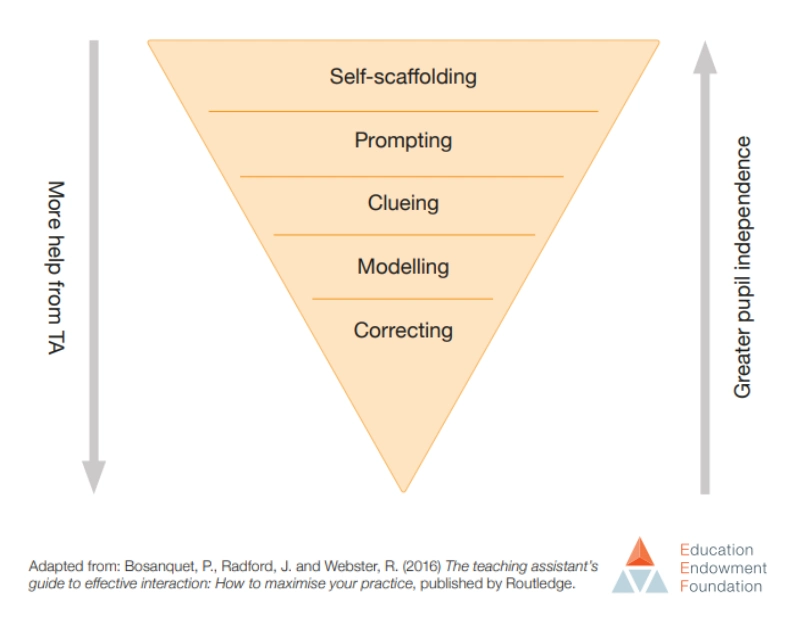
Promote independence
While one-to-one or small group support is an important feature of adaptive teaching there are pitfalls to be aware of.
The danger of over-prompting and spoon-feeding pupils was first identified in the five-year longitudinal study (2003-09) Deployment and Impact of Support Staff (DISS). This found that, in many cases, TA support had a negative impact on pupil progress. Whereas teachers used strategies to encourage learning, TAs were often focused on task completion, rather than giving pupils space to come up with ideas, with some TAs writing pupils’ answers in for them under pressure to get things done before break times.
This study demonstrates, not that TAs were inherently ineffective, but that the way schools were directing them was impeding progress. More recently, the MITA (Maximising the Impact of Teaching Assistants) programme has demonstrated that when TAs are trained to help pupils develop independent learning skills, classroom engagement greatly increases. Effective strategies include:
- Encouraging pupils to feel comfortable to take risks with their learning
- Providing the right amount of support at the right time, and, as discussed above, giving the least amount of support first to support pupils’ ownership of a task.
- Using open-ended questions to promote discussion, and
- Making sure that pupils have enough time to think and respond, before jumping in.
Rob Webster, who spearheaded the MITA project emphasises that TAs need to let children sit with the problem. Speaking on a recent Special Needs Jungle podcast he emphasises;
“Thinking time is really important. One of the hardest things is just to live with a bit of
uncomfortable silence for five or six seconds while the child tries to work things out.”
Be flexible
However good support from a TA is, on some occasions, what pupils with SEND need more than anything else is more time with the teacher. Rob Webster, writing in the TES emphasises the importance of flipping roles so pupils with SEND being taught by the teacher while the TA “roves the room and uses their scaffolding skills to help [other] pupils help themselves”.
Sara Alston, speaking on a recent Sec-Ed podcast agrees, emphasising that teachers and TA should work together flexibly, as part of a team around the child. In her opinion, training should enable “anybody in the room to work with any child in the room”, as appropriate.
Be prepared
The EEF highlights the importance of good communication between teachers and TAs.
It is difficult for teachers and TAs to work in the complementary way described above if there is no time to communicate. Schools are busy places and it is often difficult to find the time for TAs to be prepared for their role in a lesson, and to feed back to the teacher about pupils’ progress afterwards. Creative solutions often need to be found.
Some schools, such as Billesley Research School, have adjusted TA working hours so they can have daily 15-minute briefings with teachers before lessons start. Other solutions include using assembly time or inviting TAs to join teachers for part of their Planning, Preparation and Assessment (PPA) time.
These meetings need not be long. Essentially, TAs need to know:
- The intended learning outcomes – what pupils are expected to produce by the end of the lesson and any flexibility for particular pupils to use other ways to demonstrate their learning.
- What is being taught and why – the concepts, facts, information being taught and the skills to be learned, applied, practised or extended.
- Key vocabulary
- What they need to do in the lesson – the strategies and approaches the teacher is going to use or wants the TA to use to support the whole class or individuals.
- Who they will support – if a TA is not familiar with the pupil(s) they support, understanding their needs and barriers to learning, but also their strengths and what motivates them will be useful.
- How and what they need to feed back to the teacher after the lesson – this is important for assessment and for planning next steps.
It’s worth revisiting Sara Alston’s framework for teachers that provides guidance on how to distil meetings into the learning intention, key vocabulary and outcome in order to maximise limited time. A useful tip is for teachers to annotate their slides with the main learning intentions so that these can be shared with TAs in advance.
Bring TAs into the continuous learning cycle
Some schools already set aside dedicated development time for TAs as part of whole-school teaching and learning sessions. This allows the SENCO to provide SEN CPD to everyone, and one-to-one support when TAs need this.
In secondary schools, a ten-minute departmental briefing at the beginning of the day might also provide an opportunity for TAs to ask questions when teachers recap strategies and can provide a bit of a confidence boost. Management and reporting structures for TAs can be particularly complex in secondary schools so it’s important that TAs have clear channels of communication and feel that their feedback is valued.
Specialist Teaching Assistants (STAs)
Increasingly, ‘specialist’ TAs are being used to support children within a particular area of SEND. This might include leading interventions both inside and outside of the classroom as well as developing a toolkit of strategies while taking into account individual needs.
The EEF report that the impact of TAs delivering targeted interventions in one-to-one or small group settings shows “a consistent impact on attainment of approximately three to four additional months’ progress”. However, these positive effects are only observed when TAs work in structured settings with high-quality support and training. If TAs who deliver interventions are untrained and unsupported, this can have a negative effect on learning outcomes for pupils.
In September, the new Level 5 Specialist Teaching Assistant (STA) Apprenticeship was approved by the Institute of Apprenticeships and Technical Education (iFATE). This is a watershed moment as it will provide higher-level training for TAs that can be funded using the Government’s apprenticeship levy. Until this announcement, no funding was available for higher-level TA qualifications – leaving many TAs to pay for training out of their own pocket or make the case for using limited school funds.
Now, SEND experts and educational psychologists from Real Training have collaborated with Ofsted-outstanding apprenticeship provider, Educational and Sporting Futures (ESF) to offer the Level 5 apprenticeship, starting in December.
Participants will have the option to specialise in SEND, literacy, and social and emotional wellbeing, reflecting the diverse roles and responsibilities of TAs. The hope is that it will raise standards of support and help with staff retention.
Leaders need to show support
If TAs are to undertake a more strategic role in the classroom (as many of them are already being asked to do) this needs to be supported with more in-depth specialist training around pedagogy, SEND and SEMH.
Regardless of whether schools plan to increase or decrease the number of TAs on their books – the staff they retain must be well-trained and well-supported. TAs play a vital role in the journey towards becoming a more inclusive school, and now more than ever they need a strong show of support from teachers and senior leadership teams.
Training may only be one part of the solution when it comes to retaining highly skilled TAs, but arguably it is the most important.
Adaptive teaching involves making adjustments to instructions and teaching materials for children, based on how their needs present in the moment. It is based on the premise that students with additional needs don’t benefit from being handed out segregated worksheets and tasks. Instead, the whole class is encouraged to engage with the same learning objectives and broadly the same (or very similar) content.
The adaptive approach recognises that:
– there are different starting points and ways into a topic
– some children might need greater support or scaffolds to access learning
– every child’s learning pathway can look slightly different.
Teachers are encouraged to continuously modify their approach, content and delivery in real-time, based on how their students are responding during the lesson.
The concept of adaptation appears in the DfE’s Teachers’ Standards but it is only in the last couple of years that the notion of ‘adaptive teaching’ has really come into its own. So much so, that the UK Government has made it a priority in the revised initial teacher training. Most British International schools are also now embracing the adaptive teaching model.
While it is universally agreed that adaptive teaching is the way forward, the extent to which it has been successfully embedded in teaching practice still varies hugely. Before we look at how we can overcome this in both UK and international schools, it’s worth revisiting why it has come about.
Why has adaptive teaching replaced differentiation?
For all the good intentions around differentiation, it became a byword for setting low expectations of children with learning difficulties. The use of “all, most, some” learning objectives, as a classic example, shut off parts of the curriculum to those in the ‘bottom’ tier.
Research suggested that this raised stigma without improving outcomes. In 2019, OFSTED conducted a review and found that ‘in-class differentiation, through providing differentiated teaching, activities or resources, has generally not been shown to have much impact on pupils’ attainment.’ Creating different resources had become a distraction from meeting the present needs of each individual. Sara Alston, a leading voice on adaptive teaching recently summed this up neatly, writing in Headteacher Update:
“Fear of Ofsted and others wanting to see evidence that differentiation was happening has led over the years to monstrosities such as three-layer planning, multiple worksheets, static ability groups, and low fixed expectations for all.” -Sara Alston, SEN consultant and former SENCO
This is not to say that we should throw the baby out with the bathwater. There are aspects of a differentiated curriculum that will always be required. It is not fair or reasonable to expect children working two years below age-related outcomes, for example, to meet the same learning outcomes as their peers. There will also always be a place for specific, targeted interventions, such as for literacy support.
The below table shows how adaptive teaching attempts to nudge us out of the bad habits brought about by a misunderstanding of differentiation.
| ADAPTIVE TEACHING | DIFFERENTIATION | |
|---|---|---|
| TIMING | Adjustments carried out in real-time | Worksheets planned ahead of lesson |
| FOCUS | Individual needs | Group needs |
| FLEXIBILITY | Anticipated adjustments but flexible delivery based on present need | More rigid segmentation based on assumed need |
| LEARNING OBJECTIVES | Shared | Tiered |
| HOMEWORK | Same content but varying levels of scaffolds | Mild, spicy, hot |
| SUPPORT | – Modelling – Self-directed learning – Floating TAs – Different starting points – Scaffolds set up & removed appropriately | – Prescribed goals – “Velcro TA” support – Emphasis on task completion |
| LANGUAGE | Avoids jargonistic terms Models growth mindset – X can’t do it yet | “All, most, some” “Must, should, could” “LATS, HATS” and other acronyms |
| EXTENSION | Extended questions available to all | Bolt-on challenge questions offered based on target grade |
| GROUPING | Flexible | Fixed |
What does good adaptive teaching look like?
There is no single blueprint for adaptive teaching that can be easily lifted from a book in the same way a lesson plan can. However, there are common strands to the underlying method, which can benefit a range of children beyond those with SEND, including EAL students, absentees and high achievers.
Meets emotional needs and promotes a growth mindset
Learning must adapt to the child’s present emotional state. If a pupil is already feeling anxious the teacher might need to allow for a movement break or put more scaffolds in place that day. If they are feeling insecure in their understanding, re-teaching might be required. If they are bored or frustrated you might need to adapt the direction of the lesson on the spot or offer choice in how they want to learn.
Follows a cyclical process of assessment and adaptation for individuals
Adaptive teaching requires continual assessment of where students are. This means knowing your students, understanding how much scaffolding they need, acknowledging differing curricula and accepting multiple ways of expressing and demonstrating learning. Adjustments happen in real-time based on continual assessment throughout the lesson, followed by adaptations that might include going down a different lesson path.
Makes effective use of scaffolds but withdraws them when no longer required
There are different ways of approaching adaptive teaching, one popular method is the scaffolds, scale, structure and style approach outlined brilliantly by Alex Quigley. The diagram below shows more about how these concepts work together. The most important thing about scaffolds is that they are removed once the pupil builds confidence – the “I do, we do, you do” model is just one framework you can use to start to encourage independence.
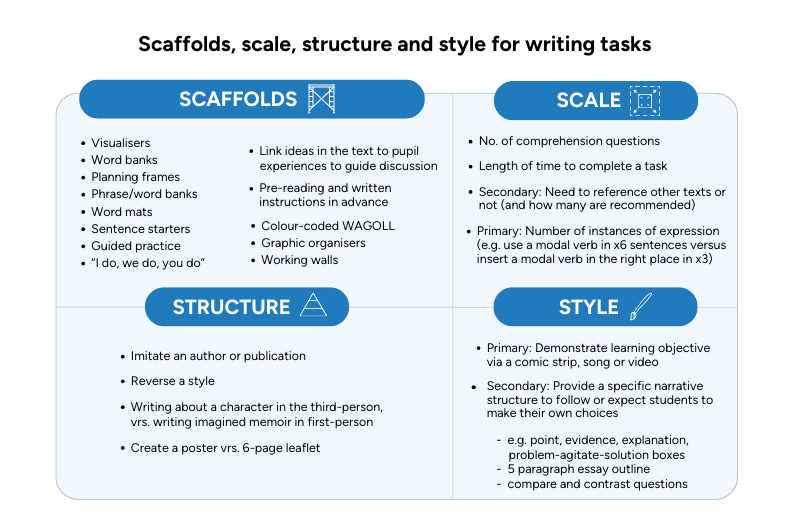
Meets sensory needs as well as balancing cognitive load
If a child’s sensory needs are not being met they will not be in a position to learn. This can be as simple as making effective use of sensory breaks, providing fidget tools, changing the lighting, or adjusting a uniform policy. Some children might benefit from ear defenders or visual supports, or being able to take their shoes off in order to feel the carpet. Writing in the TES, Leyla Gambell, an experienced SENCO, suggests having a range of pre-agreed sensory supports:
“Encourage open dialogue with and between students, where they can ask each other if they are feeling overwhelmed and offer tools to help.” – Leyla Gambell, SENCO
The graphic below sums up the difference between the two approaches.
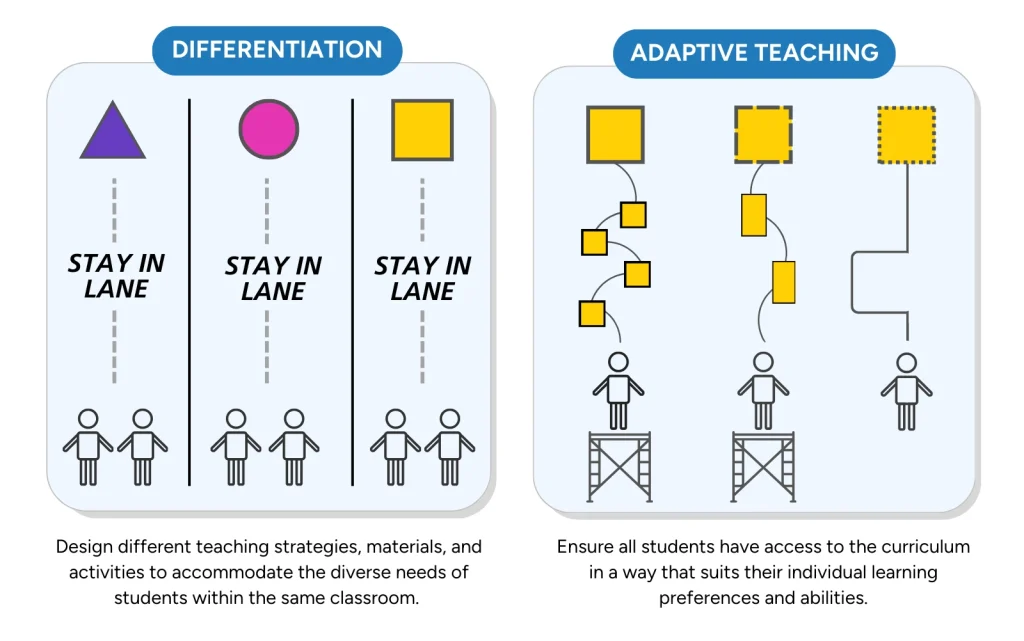
Adaptive Teaching: Enablers
1. Effective use of pupil passports
Sofia Keigher, Assistant Head at Brighton College Bangkok explains why abandoning target-driven IEPs has enabled teachers at her school to embrace adaptive teaching:
“We found that teachers were planning to meet targets rather than what was actually being presented as an immediate need in the lesson. They also didn’t take into account the fact that needs were differing in different environments…[..] it created a culture of box-ticking between the SENCO and teacher.” Sofia Keigher – Assistant Headteacher, Brighton College Bangkok
If the pupil has a suspected or identified need, the SENCO and class teacher sit down and if they feel it is creating a barrier to how the pupil accesses the school environment, a passport is created. A Google form is used to capture information from staff as well as one-to-one meetings held to capture pupil and parent voice.
The passports allow staff to share knowledge of the individual in order to adapt their teaching practice as required, without setting artificial targets. The information covered includes adaptations for students within the classroom and in other contexts such as PE, music or at break times, as well as any formal access arrangements, specific interventions or resources in place. Pupil passports are regularly updated as teachers and support staff, students and parents provide feedback on what is and isn’t working.
Sofia encourages staff to use the passports to help them plan lessons, emphasising that they should be living documents. While the SENCO has overall responsibility for updating them, all members of staff, including TAs are encouraged to regularly share observations.
“Instead of creating a multitude of worksheets, it’s more about having a look at the lesson plan in order to pre-empt what might come up. So, knowing this individual pupil and their pupil passport what might they find tricky? What potential barriers might crop up and what do I plan to do about this?
It perhaps saves pen-to-paper planning time but maybe not the more kind of pedagogical and cognitive planning time.” -Sofia Keigher
> Take a closer look at Sofia’s example passport for a hypothetical pupil with autism, or you can download a blank template here.
2. Better use of formative assessment
For adaptive teaching to be a success, teachers need a good understanding of the knowledge children are bringing to the lesson, as well as more feedback about how things are going throughout. Rather than relying just on quizzing and marking, this could take the form of sitting with students and giving useful comments and feedback, or using hinge questions. Two particular things to consider are:
Live modelling going through your own or a student’s response, both in a whole-class or more directed way.
Self-assessment, particularly through techniques such as thumbs-up, and thumbs-down pictures to help learners express their own level of understanding.
Class whiteboards can help the whole class show what they know and understand, while mini-whiteboards can be useful for directed learning. Some students might find it helpful to receive feedback in the form of audio notes that they can listen to again later.
3. Training and mentorship
Adaptive teaching is not a complete u-turn from what was being practised before and is what many experienced teachers are already doing. However, it can help staff to try a range of approaches, particularly micro-adaptations, and share knowledge of what is working best for a particular individual or individuals in their class. This can be where a mentor steps in.
It is also useful for teachers to gain a better understanding of the psychology behind working memory to understand why certain scaffolding techniques work, as well as broadening their repertoire, particularly when it comes to supporting pupils with dyslexia, autism and ADHD.
> DISCOVER OUR COURSES on Cognition and Learning, Dyslexia and Autism or other aspects of SEND to deepen your knowledge.
4. Technology
AI and assistive technology have vast and varied potential to support scaffolding.
Just a few possibilities include:
- Adapting a passage of text to remove tricky words or to help provide additional explanation around a work of Shakespeare
- Generating images to help with the concrete pictorial abstract approach in maths
- Front-loading vocabulary
- Providing translation support for EAL students
- Adjusting instructions
- Using AI (ChatGPT/Magic AI etc.) to describe a graph to pupils, or help generate one
- Leveraging text-to-speech generation for longer narrative passages
Adaptive Teaching: Barriers
1. Curriculum constraints and fear of deviating from the plan
Teachers may have valid concerns over covering the learning objectives and meeting expectations. Yet ultimately children will have a better understanding of the lesson content if the pace of lessons is adjusted to allow for more independent learning and re-teaching.
As Ginette Moore, iSENCO tutor with Real Training comments;
“It’s okay to deviate from the lesson plan or even push it straight in the bin if no one has the prior knowledge to access the content or if a small group of children need to come back to the carpet with the TA or teacher to go over examples again.” – Ginette Moore, iSENCO tutor
When it comes to concerns about time, using split-off groups and adjusting the scale of the task means pupils can still achieve the learning objective but in a less demanding way.
With greater autonomy can come greater uncertainty and teachers need to know when particular programmes might need more conservative fidelity and when there is freedom to deviate.
2. Strategy overload
On a separate, but related note, in an informative blog, Gary Aubin also makes the argument that the most successful schools don’t “overwhelm their staff with strategies” explaining that fixed lists of strategies in pupil profiles can prevent a teacher from being adaptive. Instead, teachers should distinguish between the core “non-negotiables” within pupil profiles and view everything else like a menu of options that may, or may not, be applicable for the pupil, depending upon their approach to delivering the lesson and its universal ‘built-in’ aspects of inclusion.
3. Behaviour change from senior leadership
Historically, leadership often took the presence of multiple colour-coded worksheets as evidence of accommodation for pupils with SEND. Now the way we evaluate success has changed. Lesson observation records need to reflect the new approach and those observing should put themselves in the pupil’s shoes – is it evident that teachers know their pupils?
Leaders need to put their faith in teachers and allow them to act with autonomy. They also need to ensure communication is clear and consistent across the school. It can be frustrating and upsetting if there is an agreement in place between teacher and pupil that they can take their tie and jumper off in one lesson, only for the student to be subsequently told off by another member of staff for doing so in a corridor.
4. Language and mindset
Writing in the TES, Margaret Mulholland describes how several school leaders have had to actively re-think their use of language. One school in particular has ditched the use of acronyms “LATS” (low attainers) and “HATS” (high attainers) as they felt it was leading them into poor habits.
Often this comes down to pulling apart some of the things that were previously considered good practice – like “all, most, some” and exploring why this language and accompanying mindset is no longer helpful.
5. Poor utilisation of TAs
Teaching assistants can play a fundamentally important support role when it comes to adaptive teaching, (especially as they often spot things about individual children that the teacher doesn’t) and can also elicit student viewpoints while the lesson is taking place. But if they are jumping in to solve things for pupils too soon, or do not have sufficient depth of knowledge around effective support with scaffolds, their impact is diminished. Better training for TAs would rectify this, as well as more CPD for teachers on how to best collaborate with their support staff as well as more time to collaborate.
> EXPLORE FURTHER. Visit our course page on the Level 5 Specialist TA Apprenticeship to learn more about the new SEND career pathways for teaching assistants.
6. Perceived lack of resources or staff (especially in international schools)
Adaptive teaching empowers everyone and means that frontline SEND support is not just the responsibility of the SENCO. Many schools, particularly those in international environments, have reservations because inclusion teams are small or they don’t have the resources, but there are many low and no-cost ways to make adaptations.
The need for fluid learning journeys
Adaptive teaching can benefit all children, fostering a growth mindset and avoiding the scenario where expectations are capped. It requires teachers to both anticipate and respond to needs, and embrace greater fluidity in learning journeys, student grouping and use of teaching assistant support. It recognises that, at times, the curriculum will need to be adjusted for some, but that this should be the exception – not the rule.
Although adaptive teaching builds from the responsive skills and behaviours that many teachers are already deploying, there can be knowledge gaps within schools.
Some teachers are also hesitant about the idea of going “off-piste” and deviating from the lesson plan. Speaking on a recent podcast, George Athanasiou, a Headteacher and educational consultant underlined the need to let teachers embrace this. His advice? “Focus on the outcome and let the journey happen organically. Let the children decide how they’re going to reach that outcome. The best lessons are the ones that are completely off the page. And as a teacher, you have to be confident in that.”
Resources
Take a look at our recent webinar on adaptive teaching – you can find the recording here.
Alex Quigley writes a great introductory blog explaining the Scaffold, Scale, Structure and Style approach: https://alexquigley.co.uk/adaptive-teaching-scaffolds-scale-structure-and-style
PrimaryTimery: A great article on adaptive teaching with practical examples and strategies to support memory https://primarytimery.com/2024/03/29/adaptive-teaching-the-four-verbs-approach/
The Center for Family Support: A useful step-by-step guide to creating One Page Profiles https://www.youtube.com/watch?v=brcjbVkbph0
Daniel Sobel and Sara Alston’s book The Inclusive Classroom, a fantastic guide for Primary and Secondary teachers. It addresses why we should meet needs rather than focusing on diagnosis, and guides you through different phases of a single lesson and how they can be adapted. Sobel, D. and Alston, S (2021). The Inclusive Classroom. Bloomsbury https://www.amazon.co.uk/Inclusive-Classroom-Daniel-Sobel/dp/1472977920
Jon Eaton writes a guest blog about how adaptive teaching has benefitted his Trust: https://educationendowmentfoundation.org.uk/news/moving-from-differentiation-to-adaptive-teaching
A basic pupil passport template can be downloaded here
The Education Endowment Fund (EEF) have good general information about adaptive teaching https://educationendowmentfoundation.org.uk/news/eef-blog-assess-adjust-adapt-what-does-adaptive-teaching-mean-to-you
Sara Alston writing in Headteacher Update: neatly summarises what went wrong with our previous use of differentiation: https://www.headteacher-update.com/content/best-practice/adaptive-teaching-or-differentiation/
George Athanasiou gives a great interview on the School Behaviours podcast where he describes how adaptive teaching can boost engagement, reduce behavioural issues and improve outcomes.https://beaconschoolsupport.co.uk/podcast/the-impact-of-adaptive-teaching-on-pupils-with-semh-needs-with-george-athanasiou


